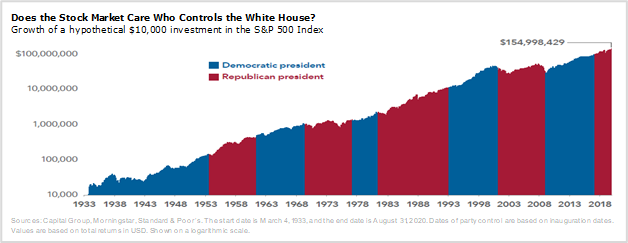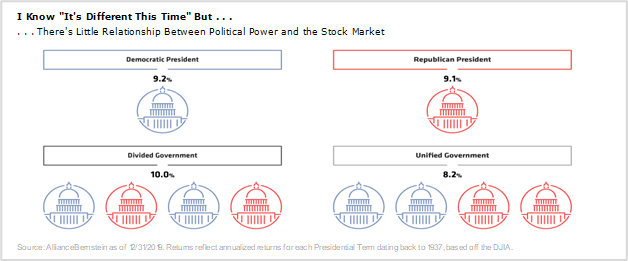Politics and Your Portfolio: Navigating the 2020 Elections
October 28, 2020. By Mark Barry:
Politics have dominated the national conversation in recent months, and with November 3rd being a week away emotions are running high. While many people may feel very strongly that a preferred candidate and/or party affiliation is best for the country, politics and investing can be a toxic mix for a variety of reasons. Investors should not allow their political views to drive portfolio decisions, a concept that we expand upon in this note. That said, the outlook for government policy does matter at the margins, and as such we highlight a few key considerations for investors.
Stick with the Plan: Elections/Politics Should Not Drive Investment Strategy
While elections do indeed have the potential to influence investment returns via their policy consequences, they are only one of the many factors that influence the economy and markets, and are a relatively less important one at that. History demonstrates that neither political party has a monopoly on strong economic growth or investment returns, nor do election results have any clear predictive ability for market performance moving forward. Whether you are absolutely thrilled or bitterly disappointed with the results come November 3rd it is important to maintain your investment discipline and avoid any dramatic changes in your long-term investment strategy or asset allocation.
Stocks Trend Higher Over Time
Markets have done well under both Democratic and Republican administrations and staying invested has proven to matter much more than the political party in the White House. Over the long-term the stock market is primarily driven not by government policy, but by earnings and economic growth.

Predictions Tend to Be Wrong
Market predictions based on election results have tended to be wrong, and even “Wall Street has shown no ability to get [them] right in the past” as noted in this article from Bloomberg. We chose the examples below to avoid picking on anyone in particular, but a quick web search will yield a number of predictions that proved to be wildly off the mark. Bottom line is that large allocation shifts based on political prognostications are likely to be counterproductive and should be avoided by investors.

The Market Does Not Do Better Under the [insert preferred political party here]
The body of evidence suggests that the link between politics and market performance is weak at best, and any claims of superior historical performance by either party should be met with skepticism. While there are surface-level partisan analyses to support the preferred narrative, the relationship between politics and stock market performance is not statistically significant.

Elections are Still Important: Key Considerations for 2020
While elections should not drive investment strategy for the reasons explained above, they do have the potential to impact the economy and markets via the resulting shifts in government policy. Thus it is prudent for investors to objectively assess the range and probability of policy outcomes and their potential implications for economic growth and asset prices. We would remind investors that the biggest variable for the global economy and markets will remain COVID-19, with risks to both the upside (vaccine development) and the downside (continued spread/lockdowns). That said, there are a few items that we would highlight as key considerations for the 2020 elections that we will be monitoring moving forward. In no particular order:
- Corporate and individual tax rates, other tax policies
- Size and scope of an additional fiscal package which is widely viewed as necessary
- Degree of spending plans and possible impact on the bond markets
- US-China relations and trade related politics
- Policy changes related to the energy, healthcare, and technology sectors
- Risk of contested election and potential market volatility
Post-Election Day: Maintain Investment Discipline and Focus on the Long-Term
Irrespective of the outcome on election day, investors should expect some volatility as markets attempt to incorporate the results into asset prices. A scenario where the winner of the presidential election is not immediately apparent increases the risk of a contested election; market volatility is likely to be more consequential and prolonged if this is the case. However, we would encourage investors to:
- Maintain investment discipline through any post-election day market turbulence
- Avoid portfolio decisions driven by political views
- Focus on the long-term, as volatility is a part of investing
- Remember that markets do well regardless of which political party holds power in Washington
